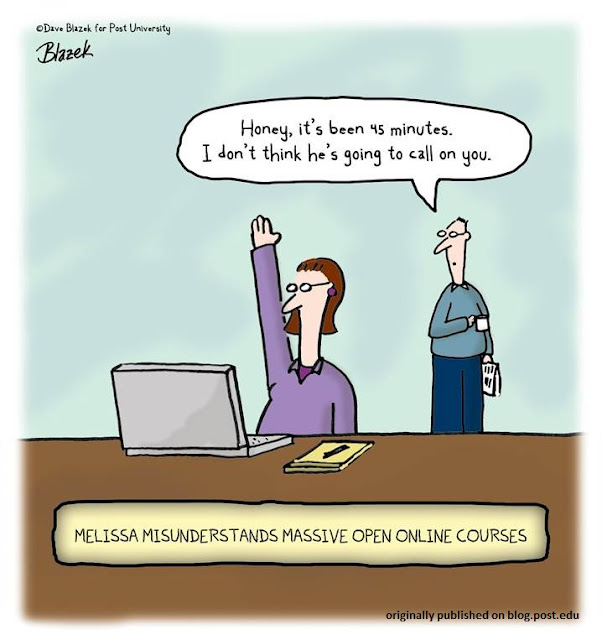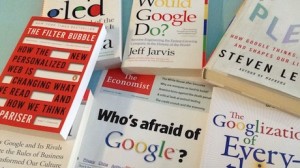
(Post University cartoon/Dave Blazek, licensed under a Creative Commons Attribution-NoDerivs 3.0 Unported License.)
If you are even a casual reader of stories about higher education, you have been encountering a lot of stories lately about “massively open online courses,” or MOOCs. These experiments in Web-centric learning allow people (often lots of them) to enroll (often for free) in courses taught through colleges and universities (often well-known ones).
- Proponents generally hail MOOCs for their promise in “bringing scale to education” and for potentially removing barriers like time, money, and geography that have stood in the way of self-improvement for many people around the world.
- Skeptics often dispute the idea that they offer much education at all, noting that there seems to be more curiosity than commitment among the enrollees (the vast majority of whom do not finish, and some of whom do not start, the courses they sign up for).
There are many nuances to the arguments and observations of both camps, of course . . . and there are far more camps than two. For example, there’s the camp that says the M stands for “massive” and modifies “courses,” and the camp that says it stands for “massively” and modifies “open.” (The first construction shows up more often in Lexis-Nexis, but the citations for the second are earlier.)
And of course online teaching has been around in one form or another for a long time already, and not just as a sideline or sideshow. As just one anecdotal example, my alma mater, North Park University, offers students whose careers were interrupted the chance to complete their bachelor’s degrees entirely online in five specific majors, including one of its specialties, nonprofit management.
There has been a fair amount of fervent back-and-forth volleying on the topic, not surprising, sometimes approaching the intensity of doctrinal disputes within tiny sects. Last week we got some data to leaven the discussion from the Chronicle of Higher Education, whose “The Professors Who Make the MOOCs” was based on a survey of 103 of the 184 professors the Chronicle could identify as having taught a MOOC to date (as of February). Overall, they asked these early adopters, “Do you believe MOOCs are worth the hype?” and 79% said yes. The entire piece and its accompanying data are worth exploring.
Along the way, some of the most thoughtful and quotable commentary I have read on MOOCs comes from Prof. Siva Vaidhyanathan of the University of Virginia, whose acquaintance I made through teaching his book The Googlization of Everything (and Why We Should Worry). He fears “a new era of unbounded hyperbole” and, in an earlier Chronicle post, offers a useful distinction from his own experience: “MOOCs inform me. But they do not educate me. There is a difference.”
 I am paying close attention to Vaidhyanathan in part because I’ll be using his book again later this year, when I am scheduled to teach a MOOC based on my Northwestern undergraduate class, “American Media through the Lens of Google” (described in this 2012 blog post). Northwestern recently signed on with Coursera, which calls itself a “social entrepreneurship company” and is one of the pioneers in this arena along with Udacity, edX, and 2U (the last another Northwestern partner). My Coursera effort is one of the first six announced by the university, and I’ll be spending a substantial amount of time in the weeks ahead creating online course material.
I am paying close attention to Vaidhyanathan in part because I’ll be using his book again later this year, when I am scheduled to teach a MOOC based on my Northwestern undergraduate class, “American Media through the Lens of Google” (described in this 2012 blog post). Northwestern recently signed on with Coursera, which calls itself a “social entrepreneurship company” and is one of the pioneers in this arena along with Udacity, edX, and 2U (the last another Northwestern partner). My Coursera effort is one of the first six announced by the university, and I’ll be spending a substantial amount of time in the weeks ahead creating online course material.
So, why am I doing this? At this point, I can answer only with a series of additional questions, these among them:
- What insights might emerge from teaching similar material to online and traditional students at the same time, as I intend to do?
- Indeed, can interactive, online “assets” created for an environment like this be usable or helpful in an “on-premises” setting as well? On the face of it a “blended model” seems desirable; see this Thomas L. Friedman column about a conference called “Online Learning and the Future of Residential Education.”
- Further, what do current university students think about such approaches? I am hiring a number of students who have taken this class to test material as I develop it, to get an idea even before the MOOC begins.
- What can be learned about the impact and reach of a topic like mine from feedback, whether explicit or inferred, from hundreds or thousands of interested people? (At this writing, slightly more than 9,000 people have enrolled. The median in the Chronicle survey was 33,000, but again, that’s way more than will finish.)
- If these sorts of low- and no-cost online offerings are poised to disrupt education (perhaps in the way that low- and no-cost online offerings disrupted the news business), can I merge old lessons with new insights?
- Might a MOOC be a good way for Medill to engage with its graduates around topics that have emerged since they left Evanston?
- Might a MOOC be a good way to identify some handful of motivated online learners for future NU initiatives in online education that, unlike this offering, might be part of a degree program?
- Will it be any fun?
At the least, trying something new is generally fun. So is learning, and so is teaching. So I am hopeful that I will like the answer to the last question, at least.
See you online.
